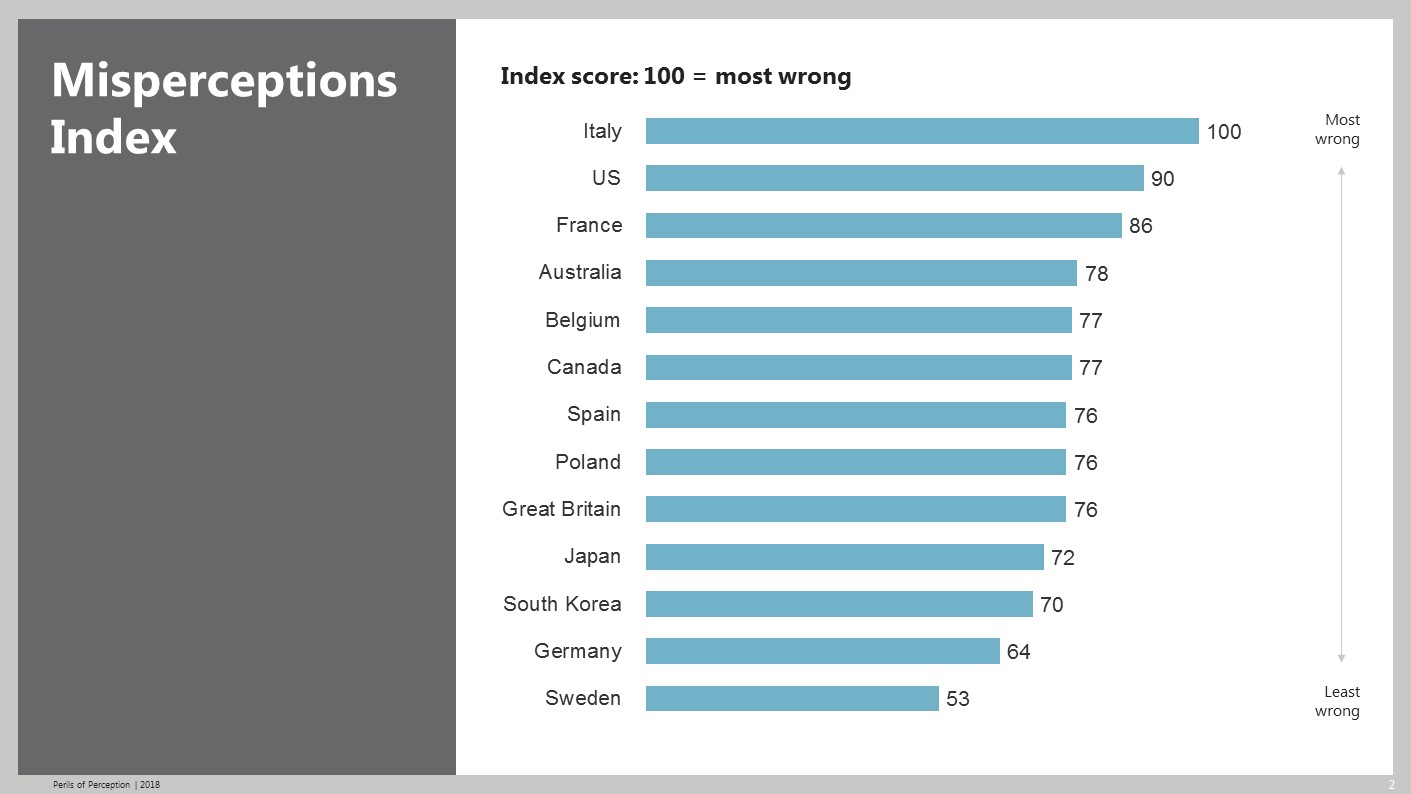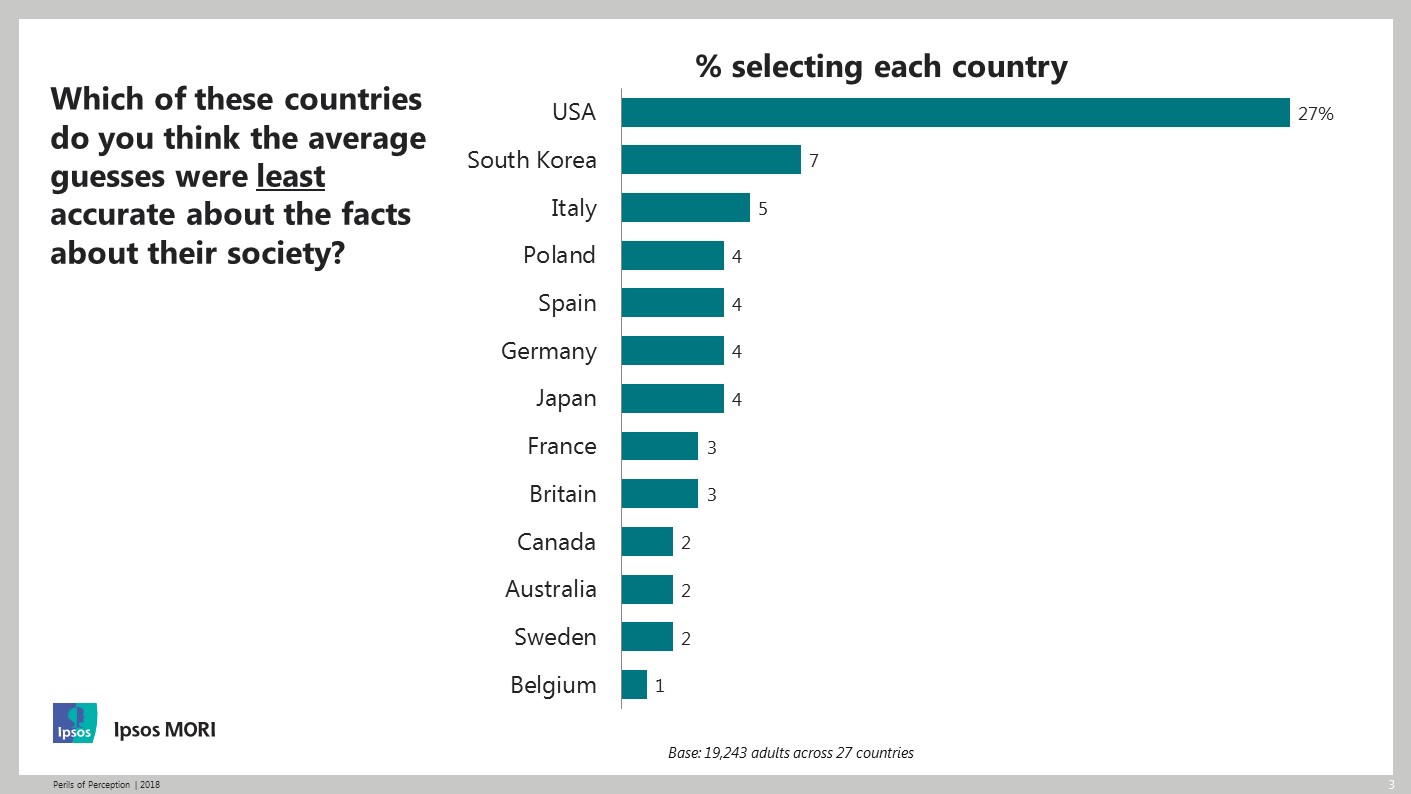People in Italy and the US are most wrong on key facts about their society

Why We're Wrong About
Nearly Everything by Bobby Duffy
Ipsos has been running studies on how wrong people are about key social realities in their country since 2014. These have been brought together in a book – The Perils of Perception – Why We’re Wrong About Nearly Everything - published 6th September.
The full series of studies can be found at perils.ipsos.com.
We have looked at all answers across the 13 countries that have been included in the study since the start, to identify which is most and least wrong in our ‘Misperceptions Index’.
This is based on over 50,000 interviews in these countries and 28 questions – everything from immigration levels, crime rates, teenage pregnancy, obesity levels, how happy people are, unemployment rates, smartphone ownership, and many other social realities.
And the ‘winner’ (the most wrong) is… Italy!

Past studies have shown the Italians are very wrong about many aspects of their society, for example:
- Italians guessed that 49% of working-age Italians were unemployed, when in reality it was 12%
- They thought 30% of their country were immigrants, when actual figures were 7%
- Italians guessed 35% of people in Italy have diabetes, when in reality it’s only 5%
The US is second worst, and is also very wrong about many aspects of their society.
- Americans thought 17% of their population are Muslim, when actual figure is around 1%
- They guessed 24% of girls aged 15 to 19 gave birth each year, when the actual figure is 2.1%
At the other end of the spectrum, Sweden is the least wrong, and are very accurate on some facts: for example, they guessed that 32% of prisoners in Sweden were immigrants, when the actual figure was 31%. But even the Swedes get a lot wrong: they guessed that 24% of the population were unemployed, when at the time it was 8%.
People think Americans are the most likely to be wrong – and Americans think that too…
We have also run a new survey asking people who they think would have the least accurate view of their own society. And the country that people picked out most often was the US, with an impressive 27% of the vote, way ahead of any other country.
And Americans think this of themselves too: 49% expected their fellow Americans have the least accurate view of facts about their society from all the countries listed.

Commenting on the results, Bobby Duffy, Ipsos, said:
Lots of people in all countries get many things wrong about their societies - but from looking across this unique series of Ipsos studies, there are clearly patterns where some countries are more consistently wrong than others. Our ‘Misperceptions Index’ summarises who was most wrong – and Italy get the dubious honour of ‘winning’.
The immediate question is why are there differences between countries? Why is Italy much worse at guessing these facts than Sweden? We’ve looked at many possible explanations in the book, everything from the education system, to the nature of media and politics, levels of trust and attitudes to government.
And one of the very few factors that seems to be associated is how ‘emotionally expressive’ the country is – that is whether people in the country tend to argue loudly, touch each other and laugh a lot.
This may seem a bit strange, but we need to remember that our guesses at these questions are partly emotional – they send a message about what’s worrying us. If immigration is a big concern, we automatically pick a big number, even if in reality immigration levels are much lower. Our misperceptions are about our emotions as much as our ignorance of the facts, and therefore it’s not that surprising that emotionally expressive countries have more exaggerated guesses.
Technical Note
- The Perils of Perception – Why We’re Wrong About Nearly Everything is published by Atlantic Books on 6th September 2018 – for more information, see perils.ipsos.com
- Over 50,000 interviews were conducted in 13 countries in studies between 2014-2017 to construct the Misperceptions Index. Full details of the studies, source data for the realities and information on the calculation of the Index can be found at perils.ipsos.com
- For the new study on which countries people thought would be most wrong, 18,243 interviews were conducted across 27 countries using the Ipsos Online panel system in June-July 2018
- Where results do not sum to 100, this may be due to computer rounding, multiple responses or the exclusion of don't knows or not stated responses
- Data are weighted to match the profile of the population



